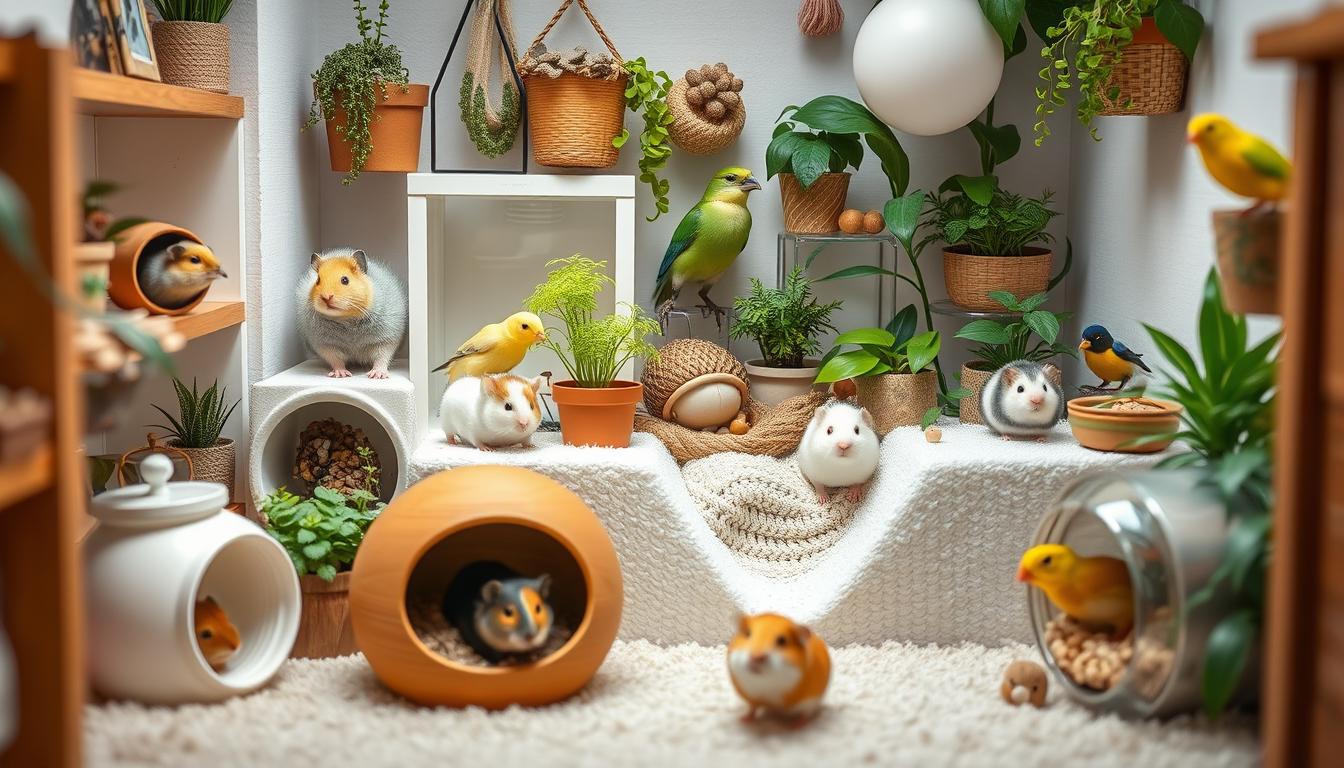Finding the right pet can be tough for those in small homes or apartments. Small pets are perfect for tiny spaces, offering friendship and fun without needing much room. Hamsters, gerbils, and fish are great for those with little space.
Small pets are easy to care for, making them ideal for busy people. They’re great for city dwellers or those with no outdoor space. They’re low-maintenance and don’t take up much room.
This article will look at the best small pets for small homes. We’ll cover their care needs and the joys of having them around. We’ll also share tips on making your home pet-friendly.
Key Takeaways
- Small pets for small spaces are ideal for individuals living in apartments or compact homes
- Apartment friendly pets, such as hamsters and gerbils, are low-maintenance and easy to care for
- Small pets are perfect for busy individuals or those with limited time to devote to pet care
- Creating a pet-friendly environment is crucial for the health and happiness of small pets
- Small pets can provide companionship and joy, even in limited spaces
Why Small Pets Make Perfect Companions for Compact Spaces
Living in small spaces? Small pets are a great choice. They need little room and offer friendship without needing big areas. Thinking about small pet care tips means looking at the perks of having small pets. These include their easy care and small space needs.
Here are some main benefits of having small pets:
- They need little space, fitting well in small homes
- They require less care, saving time and effort
- They are cheaper to care for than bigger pets
Looking for indoor pet ideas? There are many small pets that do well in tight spaces. Hamsters, gerbils, fish, and birds are just a few. With the right care, they can be great friends for those in small homes or apartments.
In summary, small pets are a smart pick for those with limited space. By exploring small pet care tips and indoor pet ideas, you can choose the best pet for your lifestyle and home.
Essential Factors to Consider Before Getting a Small Pet
Thinking about getting a small pet? It’s important to consider key factors for a happy and healthy home. Space-saving pets are great for small spaces, but they need special care. Learning about different pets, like hamsters or fish, helps you meet their needs.
How much time can you spend with your pet? Some, like mice or birds, need lots of interaction. Others, like fish, need less. Knowing this helps you create a great home for your pet. For example, happy small pets need enough space, good food, and vet visits.
Here are some things to think about before getting a small pet:
- Space requirements: Make sure you have enough room for your pet’s home and stuff.
- Diet and nutrition: Learn what your pet eats and make sure you can give them the right food.
- Veterinary care: Find a vet who knows about small pets and take them for regular check-ups.
By thinking about these things, you can make a great home for your small pet. Remember, space-saving pets may need less room, but they still need special care to be happy and healthy.
Hamsters: The Classic Compact Companion
Hamsters are a favorite among small pet owners. They are small and easy to care for. They need little space to live happily. Plus, some hamsters get along well with other pets.
Different Hamster Breeds
There are many hamster breeds, each with its own traits. Syrian, Dwarf, and Roborovski hamsters are popular. It’s key to pick a breed that fits well with your space and other pets.
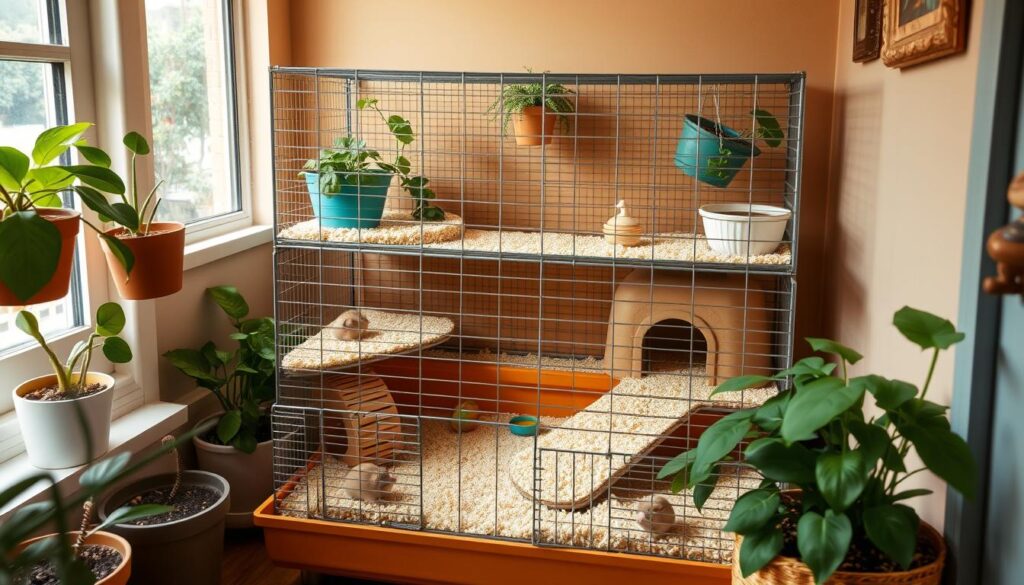
Space Requirements and Habitat Setup
Hamsters need a big cage with good air flow. A cage that’s at least 24 inches long, 12 inches wide, and 12 inches tall is best. Add hiding spots, toys, and things for them to climb on. This makes their home fun and safe.
Daily Care Requirements
Hamsters are easy pets to care for. But, they still need daily attention. Make sure to give them fresh food, clean water, and a clean cage. Also, play with them and let them explore. This keeps them happy and healthy.
Gerbils: Social Pets for Small Spaces
Gerbils are great low-maintenance small pets that do well in small areas. They love to be around people and can be fun to watch. To take care of gerbils, you need to give them a good home. This includes a big cage with places to hide and toys to play with.
Some small pet care tips for gerbils include feeding them well and keeping their water fresh. Also, clean their cage often. Gerbils can get sick, like breathing problems, so watch their health closely. If they need it, take them to the vet. With the right care, gerbils can be great friends for those living in small places.
- Social and interactive
- Low maintenance
- Entertaining to watch
- Affordable to care for
By following these small pet care tips and creating a good home, you can enjoy having gerbils in your small space.
Fish: Creating Underwater Worlds in Limited Space
Fish are great for small spaces because they’re easy to care for and look good. It’s important to pick the right size aquarium for your space and the fish you want. This ensures a happy home for your fish.
Setting up an underwater world in a small space needs careful planning. You’ll need to think about decorations and keeping the water clean. Nano aquariums are perfect for small areas, offering a unique space for fish and other sea creatures. It’s key to choose fish that do well in small tanks and know what they need.
Choosing the Right Fish Species
Popular fish for small tanks include guppies, neon tetras, and goldfish. When picking fish, think about their size, how they act, and if they get along with other fish. Proper research is crucial for your fish’s health and your aquarium’s success.
Maintenance Requirements
To keep your aquarium healthy, regular care is needed. This means checking the water, feeding your fish, and changing some of the water. By doing these simple things, you can create a stunning underwater world, even in a small space. Fish are a great choice for small pets in small spaces.
Mice: Tiny but Entertaining Companions
Mice are a great pick for indoor pet ideas in small spaces. They are tiny, social, and fun to watch. They don’t need much room, making them perfect for city living or small homes.
Keeping mice as pets is easy and affordable. They are gentle and can learn tricks. If you’re looking for indoor pet ideas, mice are a fantastic choice. They fit well in small spaces, like cages or tanks.
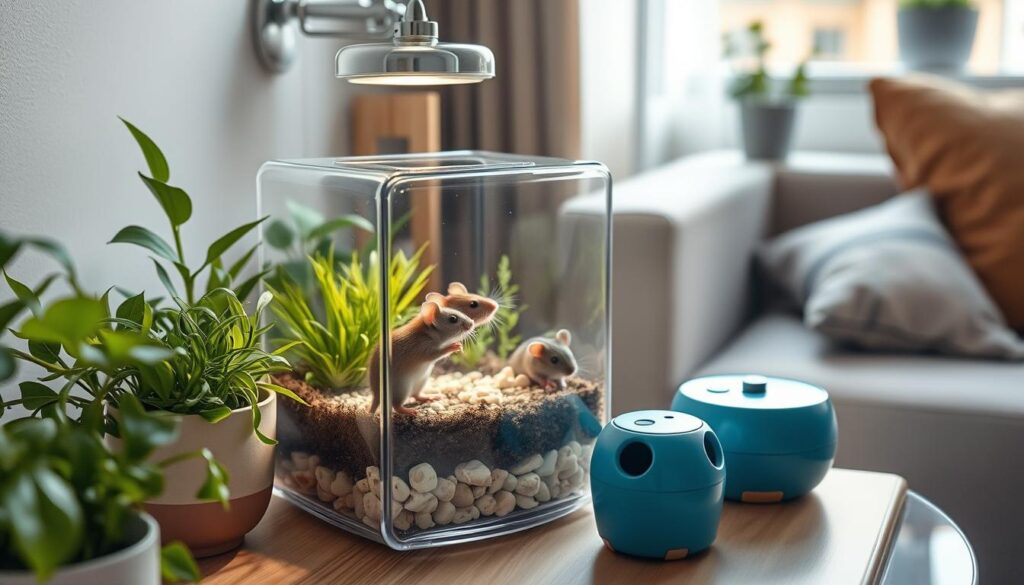
To care for mice, give them a big cage, a good diet, and lots of playtime. By following these tips, you can make a happy home for your mice.
Small Birds: Bringing Song to Your Space
Small birds can be great pets for those with little space. They bring joy and song to their owners. It’s key to think about their needs and how they can thrive in small spaces.
To ensure small pet compatibility, research different species and their needs. For instance, parakeets are popular. They can live in pairs or alone but need social interaction and a balanced diet.
Parakeet Care Essentials
- Provide a spacious cage with toys and perches
- Offer a balanced diet that includes seeds, fruits, and vegetables
- Ensure regular social interaction and exercise outside of the cage
Finch Housing Requirements
Finches are also great for small spaces. They need a big cage to fly around. Make sure it has good ventilation and a temperature of 65-75°F.
Creating a Bird-Friendly Environment
To make a bird-friendly space, consider these tips:
- Place the cage in a quiet, draft-free area
- Provide a variety of toys and accessories to keep your bird entertained
- Keep the cage clean and well-maintained to ensure your bird’s health and happiness
By following these tips and understanding your bird’s needs, you can create a happy and healthy home. This ensures great small pet compatibility.
Exploring Small Pets for Small Spaces: Advanced Options
If you’re looking for pets beyond the usual, consider reptiles and amphibians. Frogs and geckos can be fascinating companions. It’s crucial to learn about their small pet care tips and what they need in their habitat.
Creating the right small pet habitat solutions is key. This might mean setting up a special enclosure. It should have the right temperature, humidity, and light for your pet. This helps keep them healthy and happy.
- Feed them a balanced diet that’s right for their needs.
- Make their environment engaging to keep them active.
- Keep their enclosure clean to avoid sickness.
By following these small pet care tips and getting the right small pet habitat solutions, you can make a great home for your pet. Always do your homework on your pet’s needs before bringing them home. Be ready to give them the care and attention they need to thrive.
Creating Space-Efficient Pet Habitats
Living in small spaces can make finding the right pets a challenge. But, with a bit of creativity, you can make a cozy spot for your pets. Use walls and ceilings to create a space that looks good and works well.
Multi-functional furniture is key for space-saving pets. A cat tree can be a bookshelf, and a storage ottoman is a pet hideout. These pieces help make a pet-friendly space that’s also useful for you. For more tips, check out pets for small spaces for expert advice.
Storage Integration Tips
For a truly efficient pet space, think about storage. Use bins and baskets for food, toys, and supplies. Also, a pet crate can store things when not in use. This keeps your space tidy and peaceful for your pet.
Great pets for small spaces include fish, birds, and small mammals like hamsters and gerbils. They need little room and are perfect for indoor pet ideas. With some creativity, you can make a pet-friendly space that’s good for both you and your pet. Enjoy the perks of space-saving pets in your home.
Managing Pet Supplies in Limited Space
For owners of small pets for small spaces, managing pet supplies can be tough. Apartment friendly pets need careful planning to meet their needs without cluttering the space. A good idea is to set up a pet supply station where all important items are kept in one place.
Using vertical storage like shelves or cabinets can help save space. Also, picking space-saving pet supplies can cut down on clutter. Examples include collapsible bowls and compact beds.
Another smart move is to use a rotation system for toys and accessories. This means only a few items are out at a time, and the rest are stored. This keeps the space tidy and organized. By using these strategies, owners can make a cozy and useful home for both themselves and their pets.
Some perks of managing pet supplies in tight spaces include:
- Less clutter and better organization
- More safety and fewer tripping hazards
- A nicer look for the living area
By following these tips and being mindful of pet supply management, owners can make a peaceful and comfy home. This home will meet the needs of both pets and owners.
Maintaining a Clean Environment with Small Pets
Keeping a clean environment is key for your small pets’ health and happiness. It’s important to set up daily cleaning routines. These routines should match your pet’s needs and fit well with your living space.
A clean home is essential for your pets’ well-being and your enjoyment of their company. Simple cleaning habits can make your home hygienic and welcoming for everyone.
Daily Cleaning Routines
- Remove soiled bedding and replace it with fresh material.
- Clean food and water dishes regularly to prevent bacterial growth.
- Disinfect any surfaces or accessories that come into contact with your pets.
Odor Control Strategies
To keep your home smelling fresh, use odor-absorbing products or natural options. Baking soda or activated charcoal can help reduce bad smells. This makes your home more pleasant for you and your pets.
Building Bonds in Small Spaces
Creating a strong bond with your small pet is key for its happiness and health. Simple care tips can help you bond with your pet. Interactive play is a great way to do this, fitting easily into your day.
Interactive Play Ideas
Try using puzzle toys filled with treats for fun problem-solving. Play games like hide-and-seek or fetch. These activities keep your pet’s mind sharp and active.
Creating Exercise Opportunities
Small pets need lots of exercise, especially dogs and birds. Use indoor ideas like mini obstacle courses or big cages for birds. This ensures they stay active.
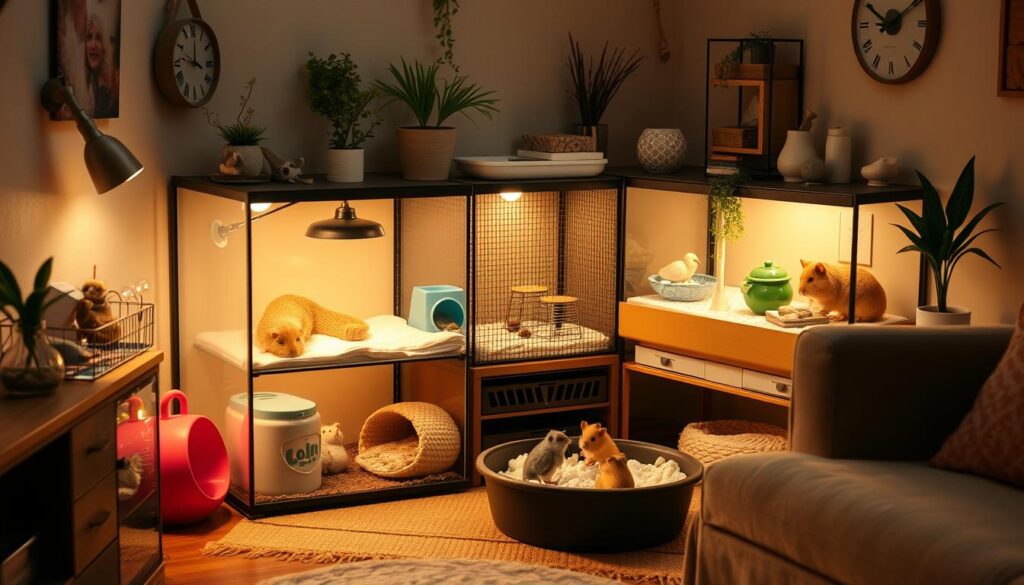
Socialization Tips
Socializing your pet is vital for a strong bond. Introduce it to new people, places, and things. This makes it confident and calm in new situations.
Take your pet on outings, meet new pets, and offer different toys. This keeps it engaged and interested.
Common Challenges and Solutions
Keeping small pets for small spaces can be tricky. One big issue is noise. Some pets like to make a lot of sound. To fix this, give them lots of toys and playtime to keep them quiet.
Another problem is mess. Apartment friendly pets can shed or make waste. To solve this, use litter boxes or cages that are easy to clean. Also, clean regularly and choose a good pet food to reduce waste.
- Noise: provide plenty of toys and exercise
- Mess: use easy-to-clean surfaces and establish a regular cleaning routine
- Pet escape: ensure cages or enclosures are secure and escape-proof
Knowing these challenges and how to solve them helps. Owners of small pets for small spaces can make a happy home for everyone.
Health Considerations for Small Pets
When caring for small pets, health is key. The right habitat can greatly improve your pet’s life. A well-designed space meets your pet’s needs, preventing health problems.
It’s important to match your pet with your lifestyle. Some pets need more care than others. Regular vet visits and a good diet are also crucial for keeping your pet healthy.
Preventive Care Basics
- Regular grooming to prevent matting and tangling of fur
- Providing a balanced and nutritious diet
- Ensuring access to fresh water at all times
- Scheduling regular veterinary check-ups
Signs of Common Health Issues
Knowing common health issues and their signs is important. Small pets can get respiratory problems, skin infections, and digestive issues. If you see unusual behavior or symptoms, see a vet who knows about small pets.
Finding a Small Pet Veterinarian
Finding a vet who knows small pets is crucial. Ask friends or search online for vets who specialize in small pets. This ensures your pet gets the best care.
Cost Analysis of Different Small Pets
When looking at low-maintenance small pets, it’s key to think about the costs. The first cost for pets can change a lot, based on the pet and what it needs. For instance, a hamster or gerbil might start with a small cost. But a bird or fish could need more money for their home and stuff.
Important costs for low-maintenance small pets include food, supplies, and vet visits. Here are some estimated costs:
- Food: $10-$30 per month
- Supplies: $20-$50 per month
- Veterinary care: $50-$100 per year
To make good choices about pets, it’s important to follow small pet care tips and plan your budget. Knowing the costs of different small pets helps you pick one that matches your life and money. 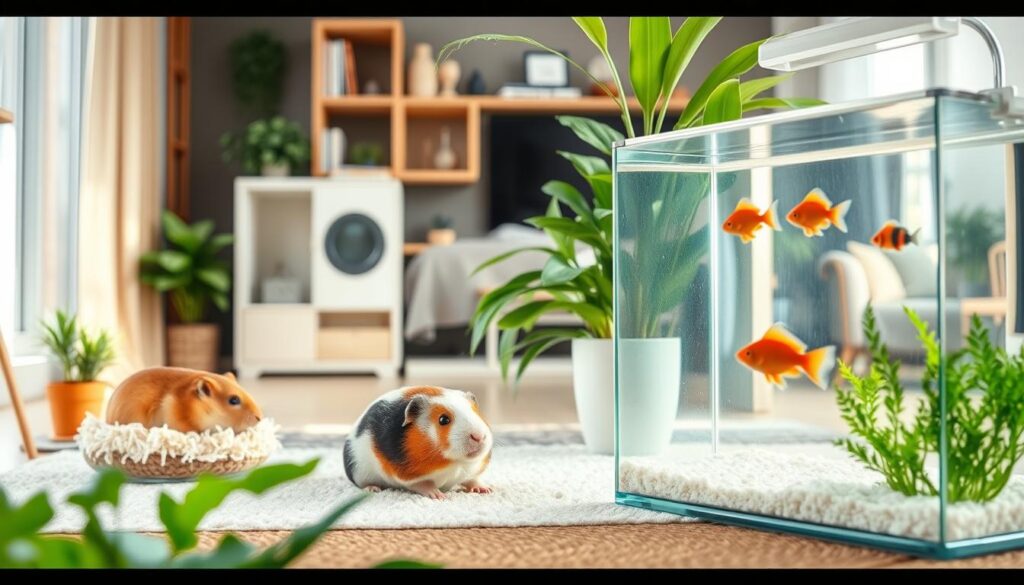
Embracing the Joy of Small Pet Companionship
Small pets can add a lot of joy to small living spaces. They offer companionship, help reduce stress, and provide endless fun. Adding a hamster, gerbil, or parakeet can make your life richer.
Creating a cozy home for your pet and spending time with them can strengthen your bond. Watching them grow and thrive is very rewarding. With a little effort, you can make your space work for both you and your pet.
Are you ready to start a new adventure with a small pet? It’s a great way to make your small space feel bigger and happier. Your new friend will bring joy and make your home feel more vibrant.
FAQ
What are some of the best small pets for compact living?
Great small pets for tight spaces include hamsters, gerbils, fish, mice, and birds like parakeets or finches. They need little room and do well in small homes or apartments.
What are the benefits of keeping small pets in compact spaces?
Small pets are perfect for small homes. They need little care, don’t take up much space, and don’t ask for a lot of time. They’re also great for kids or busy people.
What factors should I consider before getting a small pet?
Before getting a small pet, learn about its needs. This includes space, diet, and social needs. Make sure you can give your pet the care it needs and create a safe home.
How can I set up a suitable habitat for a small pet in a limited space?
Use vertical space and multi-functional furniture to make the most of your area. Make sure the habitat is right for your pet, with the right temperature, humidity, and things to do.
What are some common challenges of keeping small pets in small spaces?
Keeping small pets in small spaces can be tough. You might face noise, mess, and escape issues. Good habitat setup, cleaning, and safety can help. Knowing your pet’s needs is key.
How can I keep my small pet healthy and happy in a compact environment?
Keep your pet healthy and happy with the right food, exercise, and habitat. Regular vet visits, enrichment, and meeting their needs are crucial.
What are the typical costs associated with owning a small pet?
Owning a small pet costs vary by species. You’ll need to budget for the pet itself, habitat, food, supplies, and vet care. Research and plan your budget to care for your pet well.
How can I build a strong bond with my small pet in a compact living space?
Spend quality time with your pet, play, and exercise them. Positive training, socialization, and a comfy, enriching home will strengthen your bond.

